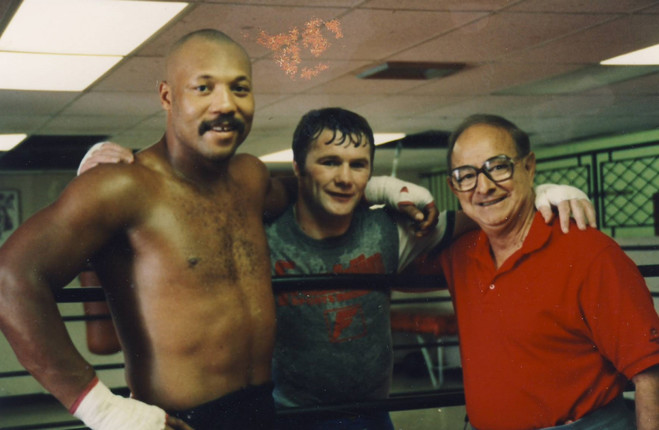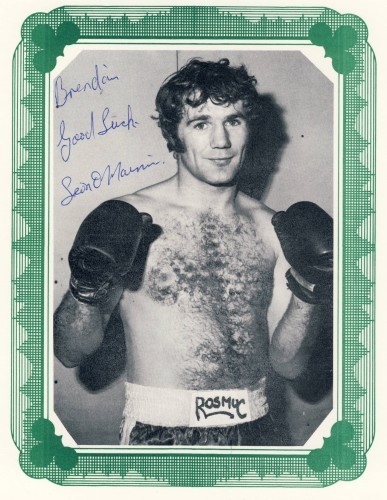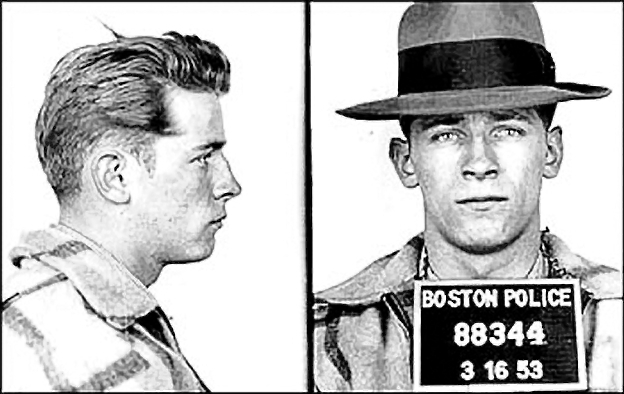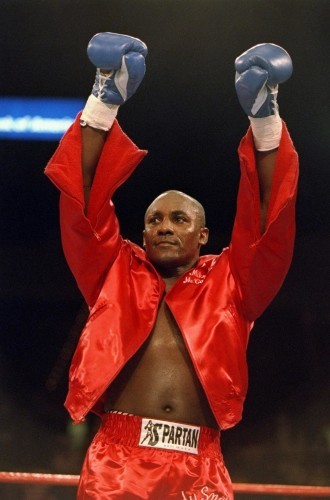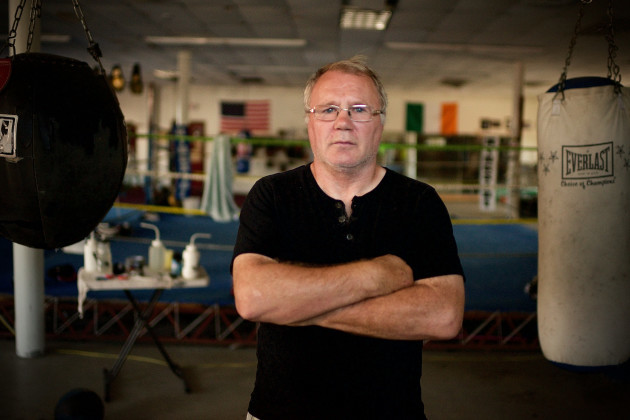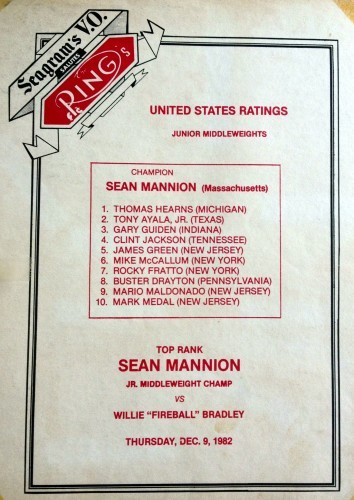Updated at 11.37
IN THE HISTORY of Irish boxing, there have been few figures to have matched the talent and toughness of Seán Mannion in his prime.
Hailing from Rosmuc, a village located in the Conamara Gaeltacht of County Galway, Mannion dreamed of being a boxer from an early age.
Born in 1956, he grew up reading copies of Ring Magazine and hoping to one day emulate his idols.
A new book, ‘The Man Who Was Never Knocked Down,’ tells his remarkable story.
What comes across instantaneously from speaking to Mannion and reading the book is his sheer pride at coming from Ireland and the strong sense of patriotism embedded in his psyche.
The former fighter has spent the majority of his adult life in Boston, having emigrated there as a teenager, but has always been determined to remain close to his homeland.
Tellingly, the Gaelic speaker insisted that his book would be in Irish as well as English — and so a version of his story was published in his native tongue in 2014, written in conjunction with the same writer who collaborated on his latest book, RTÉ journalist Rónán Mac Con Iomaire.
One of the most perceptive comments on the book comes from Kevin Cullen of the Boston Globe, who writes: “Mannion’s story is not so much about talent squandered, about how surrounding himself with better people would have given him a better chance to be an enduring world champion. It’s about a man who stayed true to his roots, his language, his culture, his family, and ultimately, his soul.”
Mannion began boxing aged 12, starting slowly before winning the Galway County championship on his third attempt in 1972, and claiming the provincial crown to boot two years later.
While he would move on to more high-profile and illustrious fights, Mannion says the opponents he came up against in this early period were as unforgiving as anyone he faced over the course of his career.
“People think I’m kidding when I say this, but I fought a lot of men from Rosmuc that were tougher than anyone I fought [afterwards],” he tells The42. “The likes of Máirtín Thornton, Mike Grealish, Tommy Conroy, Paddy McGrath, they were tougher than anybody.
People say I’m saying that because they’re from Rosmuc, but it’s the truth. They were tougher and better boxers than a lot of people, but they didn’t keep it up, they didn’t go pro. My brother Colm had the best left jab that anybody hit me with.”
The Ireland of the 1970s was a very different place to its present-day incarnation, with emigration commonplace. Consequently, a 17-year-old Mannion decided to move to Boston, where seven of his siblings were already living, without thinking twice.
In the US, Mannion lived with his brother Paddy and worked as a construction labourer, though his devotion to boxing remained steadfast. After becoming acquainted with Connolly’s Gym in South Boston, he more or less picked up where he had left off back home in demonstrating extraordinary prowess in the sport.
However, Mannion returned to Ireland after only a couple of months, as his uncle had died. He spent a year working in Meath with a steelworks company, while he simultaneously continued his boxing career, training extensively, competing for the All-Ireland title and eventually becoming the country’s junior champion.
The book recalls a touching story of how his father, Peaitín, who was dying of cancer at the time, watched the fight live on TV with immense pride.
“You should have beaten him more easily,” he said to the youngster afterwards, before father and son simultaneously broke down in tears amid this moment of mutual pride.
A year later, when Peaitín passed away, a teenage Mannion put his All-Ireland medal into the coffin alongside his father before closing it and laying him to rest.
Eager to build on his sporting success and with the next Olympic Games three years away, in 1977, Mannion opted to return to America and promptly turned pro the following year.
I left Rosmuc that time, but my heart was still there,” he says. “The way I look at it, everybody should be proud of their own home. I was proud. Any part of Ireland is part of me, especially where I was brought up in Connemara and Rosmuc.
“We speak our native language and I love all of the people there. They were always good to me when I was boxing as an amateur. They used to follow me all over Galway, they used to follow the club.
“They used to have a minibus and there would be at least 15-20 cars behind that for every fight we used to go to as kids. Not only me, but every boxer. We had a lot of good boxers in Rosmuc at the time.”
Boston has since become a second home to Mannion, though he adds: “I hated leaving Ireland, and I still do,” speaking on the day before he is due to return to the US having come over to Ireland for the launch of the book.
Part of a vibrant Irish community in South Boston, upon his return to America as a 19-year-old, Mannion continued to work in construction, while also performing tirelessly in the boxing gym at every available opportunity.
Despite a better offer from manager Paul Mitrano, where he would receive regular income through boxing, Mannion instead opted to align himself with Jimmy Connolly, a trainer with an Irish background.
And gradually thereafter, Mannion rose through the ranks in the boxing world, receiving 72 dollars for winning his first pro fight.
The Irish star’s ascent in the sport was not without challenges, however. It was a time when the mob and boxing were inextricably linked. Patrick Nee, another Rosmuc native and a distant cousin of Mannion’s, was one of those who became caught up in gang warfare.
Mannion, on the other hand, did not succumb to these temptations.
“A lot of the people who were training me, they used to be in with Whitey Bulger, the Irish mob guy,” he explains.
“More of them were with the Italian mafia and probably related to them, and things like that.
“I’d do my work with them [in the gym], but I never hung out with them. They used to ask me to come down to meet Whitey Bulgey. I said: ‘I came here for one thing and it’s not to meet any gangsters. It’s to see how far I can go for Ireland in professional boxing.’
“A distant cousin of mine, he was born in Ros Muc, he was a gangster in South Boston, Pat Nee. He told me to stay away from these people. I said: ‘Don’t worry, Pat.’ I knew them. I spent time with them in the gym. I still talk to one or two of them, they’re very good friends of mine, but I would never have anything to do with [what they do].
“I used to try to advise one of them, John ‘Red’ Shea. I said ‘stay away from them’. He said: ‘I’ll be a millionaire within a year.’ I said ‘yeah, but you’ll be looking over your shoulder’.
He did 12 years in jail [after getting arrested in 1990], but he’s fine now. He doesn’t go near them. Whitey Bulger, like he did with a lot of kids, he took him under his wing. I would never have anything to do with that.”
While Mannion refused to get involved in the criminal underworld, the association with Nee undoubtedly helped protect the boxer. The drug dealers and mobsters that populated the Irish fighter’s gym were warned off causing him any trouble. Consequently, he was allowed to thrive in the sport despite the deeply turbulent environment in which he learned his trade.
Meanwhile, the Galway native’s rise came at a time when a number of other talented boxers were emerging, with the likes of Marvin Hagler, Roberto Duran, Sugar Ray Leonard, Thomas Hearns and Mike McCallum all contributing to the intense competition that existed in the same weight divisions on which Mannion focused.
The Irish fighter’s talent and promise were increasingly apparent, after several notable wins. Of the subsequent publicity he received along with the numerous accolades and significant female attention that this success led to, he simply says: “It was nice, but I don’t really like that part of the game.”
One of his biggest early successes came against Jimmy Corkum in 1979. The American boxer was ranked as the 10th best light welterweight in the world at the time and had registered 40 pro victories and lost just once, while Mannion by comparison had fought only 13 times.
“The papers were saying I was going to get knocked out in about six or seven rounds,” Mannion recalls. “I still have the piece in the [Boston Herald], it says ‘it’s not how bad Mannion is, it’s how good Corkum is’. I beat the hell out of him and I knocked him out in the sixth round.”
Remarkably, while thriving as a boxer, Mannion was still working regularly on construction sites in the day and training in the gym during the evening.
“I was training with Pat O’Grady and his son, Sean, one day. [Sean] was lightweight champion. His dad said: ‘Can you make it a little earlier tomorrow?’ I said: ‘I don’t get out of work until about four.’ He looked at my manager and said: ‘What’s this all about? A fighter working?’ He couldn’t believe it. But that’s the way it had to be.”
In addition to this taxing schedule, Mannion also had a reputation for playing hard, despite not starting to drink regularly until the age of 23. Looking back now, he insists the subsequent talk of his supposedly excessive boozing was exaggerated, and that he never consumed alcohol while in training — only as a means of celebration after fights.
“I used to go for a few drinks if I didn’t have a fight coming up just to meet my friends and all that,” he says, dismissing suggestions that this habit significantly affected his career prospects.
There were undoubtedly some heavy sessions though, and the drinking became more out of control in the second half of Mannion’s career. There were consequently bar fights, with many onlookers unwisely deciding to test the star’s toughness first hand, as the Irishman’s pride ensured he would not simply ignore the taunts aimed at him.
But while never backing away when provoked, Mannion also plays down his apparent tendency to get into trouble outside the ring.
“I had a few fights outside, but not too many. I only ever had about four or five fights outside the ring. But if you’re in one, the news spreads.
One of my best friends, Michael Newell, we used to be taking care of our own business, but all the time, somebody would start on us. In the end, I said: ‘I’m not going to walk away anymore.’”
One of these barroom brawls led to Mannion being confronted by police and subsequently attacking officers. The resultant beating he received was brutal and the boxer ultimately spent the night in prison.
After a couple of court appearances in a case that threatened to derail his sporting career, Mannion fortuitously escaped serious punishment, as most of the charges were thrown out and there was no prison sentence or revoking of his boxing license to deal with. There is a suggestion in the book that a Mafioso, who was one of the senior figures in the New England trade union scene at the time and a huge Mannion fan, had influenced the decision.
Another incident saw him charged after a fight with a fellow Connemara native, as a result of an argument in a pub that escalated, but the charges were again dropped owing to pressure from friends of the victim, when it emerged that the popular Mannion was in danger of losing his pro boxing license.
There were mishaps for Mannion in the ring too, as he suffered narrow losses to Ruby Ortiz and Tony Suero, though both defeats were regarded by the Irishman as contentious, owing to some questionable officiating.
Yet he would soon get over those disappointments, triumphing against notable opponents in what Mannion describes as his two “favourite” fights.
First, he overcame Nino Gonzalez, who had only recently narrowly lost out to Roberto Duran, and was ranked as the world’s seventh best boxer in the division. With the fight shown live on ESPN, the Irishman excelled on the big occasion at Ice World, Totowa, New Jersey in 1982, convincingly defeating his opponent in a fight that the Los Angeles Times described as the “biggest win” of Mannion’s career.
Later that year, the 26-year-old star came up against another formidable opponent in the form of Rocky Fratto, with the fight again taking place in New Jersey (The Sands, Atlantic City) and Mannion getting just 19 days’ notice to prepare for it.
The US light middleweight champion had won all but one of his 28 fights, and was a strong favourite against Mannion, who had recently suffered controversial losses to Gary Guiden and Steve Michalerya.
Nevertheless, the Galwegian stunned his American opponent to claim a sensational victory by unanimous decision.
Mannion still has the DVDs of some of his televised fights and while he is usually reluctant to watch them back, he is willing to make an exception for those memorable bouts with Fratto and Gonzalez.
The Fratto triumph led to Mannion being named Fighter of the Year by the Boston Herald, and meant he was ranked as the number three light middleweight boxer in the world.
Having been slow to acknowledge his progress initially, the Irish media were belatedly picking up on Mannion’s success, and he was quickly becoming a hero back home. A subsequent victory over Korea’s In-Chul Baek, who had won all 26 of his fights before then, added to the sense that Mannion was on the brink of something really special.
And while hopes of fighting legendary stars such as Roberto Duran, Sugar Ray Leonard and Thomas Hearns never materialised, despite coming close to fruition in some instances, Mannion did get a shot at the vacant WBA title in 1984. His opponent at Madison Square Garden would be the much-fancied Jamaican Mike McCallum, who was unbeaten in 21 fights at the time and a ferocious competitor that Ring Magazine would ultimately rank as the second greatest light middleweight boxer of all time.
33 days before the encounter, however, Mannion endured a severe cut to his right eye in training. It meant he could not spar any more in the build-up to the bout, for fear of re-opening the wound. The Irishman’s camp considered postponing the big fight, but worries about potentially missing out on the title shot prevented them from doing so.
The world title contest was highly anticipated back in Ireland, with both RTÉ and HBO screening the fight, the first involving Mannion that viewers back home had the chance to watch from the comfort of their living rooms.
“There was a lot of support,” he remembers. “One thing about Connemara and Galway people, including Irish people all over the place, I know for a fact, when I fought for the world title in New York in 1984, there were at least 10,000 people there directly from all parts of Ireland.
“Even to this day, I still meet people who say: ‘I haven’t seen you since you were in New York that night.’
“There were 20,000 people there, and at least half of them were from Ireland.”
Yet the boxer acknowledges now that going ahead with the contest, which he comprehensively lost after 15 rounds, was a mistake.
“I shouldn’t have been fighting that night,” he says. “I didn’t have any sparring for the fight at all. I was up in the Catskill Mountains training hard. The third day, I was sparring with a guy, Hector Jaiman, and he cut my eye, and I had to get 11 stitches in my eye before the fight.
Whenever I’ve gone back [to Ireland], I wouldn’t let fighters go for the county championships unless they had sparring done, never mind going for the world title. The fight should have been postponed. I’m not sure I’d have beaten McCallum, but I’d have given him a way better fight.
“When I met him in England, 20 years after [to celebrate the anniversary of] the fight, he asked me: ‘How much sparring did you do?’
“I told him I had no sparring and two days training done. He said: ‘Thank God you didn’t, because my life would be different.’ I don’t know what he meant by that, but that’s exactly what he said to me.”
Despite the defeat and having been US-based for his entire pro career, Mannion received an overwhelming reception upon his post-fight homecoming to Ireland.
“I honestly thought nobody would recognise me or even talk to me apart from my own family and friends,” he says.
When I came out at Shannon Airport, there was a huge crowd outside. I landed at about six o’clock in the morning, and I didn’t arrive in Ros Muc until about 10 o’clock that night.
“They couldn’t have done it any better if I had won. It was impossible to do it any better.
“They had people out for me, bonfires and everything. Everywhere I went in Ireland at that time, people would get talking to me. I went to Dublin for an interview with RTÉ. When I came out, there were kids outside waiting for me. It really got my heart.”
However, the moment was bittersweet. Mannion, deep down, felt the acclaim he received was not justified as the boxer had failed to meet the high expectations he demanded of himself during the McCallum fight.
After this crushing loss, he would go on to compete in another 21 fights over an 11-year period, regularly flirting with the idea of retirement, while struggling to definitively give up on the sport that had dominated his life.
But the Irishman never fully recaptured the heights he had reached prior to McCallum, and was patently past his best in later years, as he suffered a disproportionate number of losses in comparison with the rest of his career.
“I think I stayed maybe two years too long, but I didn’t have many fights. They were using me in the end as a stepping stone and I said: ‘No, that’s not going to happen.’”
Mannion did link up with the legendary Angelo Dundee for a period following the McCallum setback, and the man who once trained Muhammad Ali admitted ruefully that he had been given a chance to work with the Irish boxer 10 years too late.
“My favourite boxer growing up was Muhammad Ali — I never dreamed I’d have the same trainer he did,” Mannion says.
“I had Angelo Dundee with me for three years. He was a gentleman. He reminded me so much of the guy who started training us [in Ireland], Mike Flaherty. They had the same attitude and personality. You’d do your work in the gym, but you’d have fun doing it. Sometimes, you’d hate to go to the gym, but with these two guys, you’d love to go to it.”
Mannion similarly shares Dundee’s regret that the pair did not link up sooner.
I wish I was with him from the beginning as a professional. Things would be way different for me. He told me ‘you’d fight for the world title and you’d win it, but you wouldn’t be fighting McCallum, because I wouldn’t have anyone fighting him.’
“He was too good. He wouldn’t let anyone like that fight him. He was supposed to fight Hagler, Leonard or Duran, but none of them would fight him.”
With Mannion struggling to recapture past glories amid a nagging sense of regret with the way the world title fight had panned out, he reflects: “I went too heavy on the drink. At that time, I didn’t care.”
The intense pressures of balancing boxing with his day job also undoubtedly took their toll, as Mannion gradually descended into a haze of alcoholism and depression — a fate suffered by more than a few high-achieving boxers of that era — which was initially only exacerbated by his retirement from the sport and the fewer distractions that arose as a result.
“I used to go to work every day and then train at night. That’s very hard to do when you’re a professional boxer, especially if you go up through the rankings, but it’s different.
“It gets tougher [as your career develops]. You have to put the training in — hard training. The training is more or less 90% of the job altogether.”
On his new book, Mannion explains: “I told [the author]: ‘If you’re going to write it, it’s got to be the truth — I don’t care whether it’s good or bad.’”
These words are backed up especially in relation to the chapter that is simply entitled ‘Drink’. Mannion’s sister, Ann, who has tried to help the former star with his alcoholism, is quoted as saying: “I tell him he should dry out or go to AA but he doesn’t believe in it. He went to an AA meeting at home a long time ago and he was a long time sober. And then when he’s not drinking and he thinks of all those things, he feels like he needs another drink.
“‘The drink will do me no harm, I’ll just have the one.’ But that’s the disease, in your head again.
“He has admitted to me a couple of times that he’s an alcoholic. And he tried, here and at home, to sober up. And he did for a while, but something always happens that drives him back to the drink.”
Mannion returned to Rosmuc in the early 2000s, opening up a boxing gym while working with pros, including Michael McSweeney and Declan Timmins. Yet it proved relatively short-lived, as the club eventually “fell apart,” and he is now back in Boston working as a construction labourer again.
Despite never being knocked down in 57 pro fights and coming within one bout of the world title, the book describes Mannion as “the forgotten man of Irish boxing,” given the relatively low profile he holds in his native land.
Now 62, Mannion insists he feels no real acrimony, despite the perceived lack of appreciation for, or knowledge of, his achievements, among the wider public.
“I don’t blame the Irish people or the Irish media for that, because I should have called them and let them know what I was doing, but I never did,” he says.
I thought I got a lot [of support] from them — when I came home after the world title fight and RTÉ would show the fight live, I can’t complain about anything like that.
“At the time too, I was in Boston and it wasn’t as easy [to attract attention] as it is now.”
Moreover, asked about his legacy, Mannion’s answer is in keeping with the fiercely patriotic individual that the book portrays
“I tried to fight for Ireland all the time,” he says. “In my heart, I was fighting for Ireland.”
Perhaps his biggest regret, therefore, is that he never got the opportunity to compete as a professional in front of a home crowd.
“That broke my heart and I told them at the time, I would fight [in Ireland] for nothing. ‘I don’t want any money, just give me a fight.’ They were trying to do that, but it still didn’t come off.”
The Man Who Was Never Knocked Down: The Life of Boxer Seán Mannion’ by Rónán Mac Con Iomaire is published by Rowman and Littlefield. More info here.
Subscribe to our new podcast, Heineken Rugby Weekly on The42, here:
